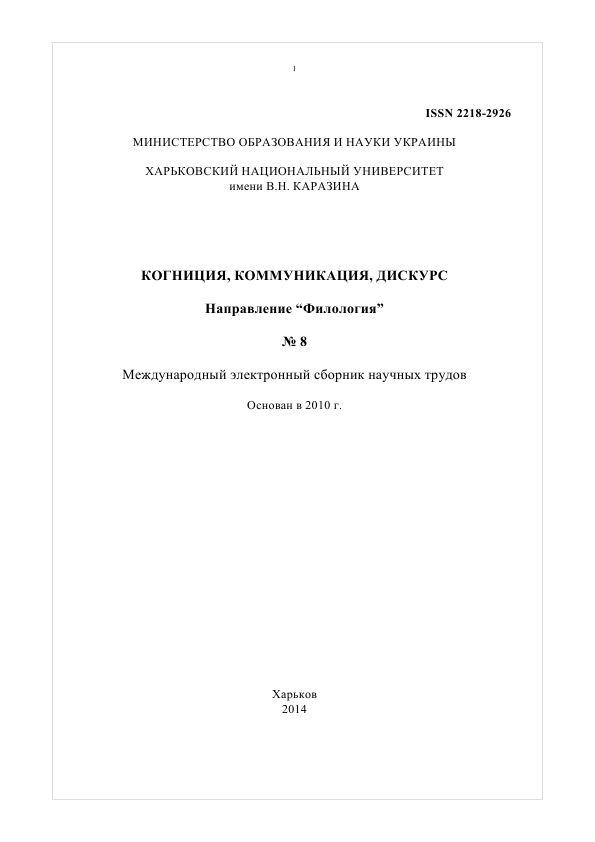Когнітивні інструменти дослідження комунікативних невдач
Анотація
У статті причини комунікативних невдач розглядаються на методологічній основі когнітивної лінгвістики, де значення одиниці мови, вжитої в акті комунікації, тлумачиться як концептуальний зміст, що відкриває доступ до концептуальної мережі енциклопедичного знання і становить собою сировину для контекстуальної інтерпретації. Результати дослідження дозволяють дійти висновку, що комунікативні невдачі мають місце у випадках, коли мовний вираз: 1) не активує у свідомості інтерпретатора ніякого концептуального змісту через а) втрату символічної функції внаслідок порушення адресантом мовних норм (лінгвальні причини); б) перебування поза фокусом уваги інтерпретатора (екстралінгвальні причини); 2) активує концептуальний зміст, не відповідний очікуванням адресанта, внаслідок належності комунікантів до різних соціальних груп, що формує їх досвід на основі різних соціальних та комунікативних практик.
Завантаження
Посилання
conscious experience in speaking and writing / W. Chafe. – Chicago : Chicago
University Press, 1994. – 392 p.
2. Croft W. Cognitive Linguistics / W. Croft, F. Cruse. – New York : Cambridge
University Press, 2004. – 356 p.
3. Eckert P. Constructing meaning, constructing selves / P. Eckert, S. McConnell-
Ginet // Gender articulated: language and the socially constructed self [ed. Hall
K., Bucholtz M.]. – New York, London : Routledge, 1995. – P. 369-507.
4. Fauconnier G. Conceptual projection and middle spaces / G. Fauconnier. – San
Diego : University of California, Department of Cognitive Science Technical
Report 9401, 1994 (available at http://www.blending.stanford.edu).
5. Fillmore C. Frame semantics / C. Fillmore // Linguistics in the morning calm
[ed. The Linguistic Society of Korea]. – Seoul: Hanshin, 1982. – P. 111-37.
6. Grice H.P. Logic and conversation / H.P. Grice // Syntax and Semantics. – New
York : Academic Press, 1975. – P. 25-69.
7. Lakoff G. Foreword to Gilles Fauconnier Mental Spaces / G. Lakoff, E.
Sweetser // Mental Spaces. – Cambridge : Cambridge University Press, 1994. –
P. ix-xlvi.
8. Langacker R. Foundations of cognitive grammar, vol. 1: theoretical prerequisites /
R. Langacker. – Stanford, Calif. : Stanford University Press, 1987. – 516 p.
9. Leech G. Principles of pragmatics / G. Leech. – L. : Longman, 1983. – 250 p.
10. Moore T. Understanding language: towards a post-Chomskyan linguistics /
T.Moore, C. Carling. – London : Macmillan, 1982. – 225 p.
11. Saville-Troike M. The Ethnography of communication [2-d edition] /
M. Saville-Troike. – Oxford : Basil Blackwell, 1989. – 315 p.
12. Schank R.C. Script, plans, goals, and understanding: an inquiry into human
knowledge structures / R.C. Schank, R.P. Abelson. – Hillsdale (NJ) : Laurence
Erlbaum Associates, 1977. – 248 p.
13. Schiffrin D. Approaches to discourse / D. Schiffrin. – Oxford; Cambridge :
Blackwell, 1994. – 470 p.
14. Sperber D. Relevance: communication and cognition / D. Sperber, D. Wilson. –
Oxford; Cambridge, MA : Blackwell, 1995. – 132 p.
15. Turner M. Reading minds: the study of English in the age of cognitive science /
M. Turner. – Princeton, NJ : Princeton Univ. Press, 1991. – 318 p.
16. Giles H. Accommodation theory: Communication, context and consequences /
H. Giles, N. Coupland, J. Coupland // Contexts of Accommodation. –
Cambridge, UK : CUP. – 1991. – P. 1-68.
Автори, які публікуються у цьому журналі, погоджуються з наступними умовами:
Автори залишають за собою право на авторство своєї роботи та передають журналу право першої публікації цієї роботи на умовах ліцензії Creative Commons Attribution License (CC BY), яка дозволяє іншим особам вільно розповсюджувати опубліковану роботу з обов'язковим посиланням на авторів оригінальної роботи та першу публікацію роботи у цьому журналі.
Автори мають право укладати самостійні додаткові угоди щодо неексклюзивного розповсюдження роботи у тому вигляді, в якому вона була опублікована цим журналом (наприклад, розміщувати роботу в електронному сховищі установи або публікувати у складі монографії), за умови збереження посилання на першу публікацію роботи у цьому журналі.
Політика журналу дозволяє і заохочує розміщення авторами в мережі Інтернет (наприклад, у сховищах установ або на особистих веб-сайтах) рукопису роботи, як до подання цього рукопису до редакції, так і під час його редакційного опрацювання, оскільки це сприяє виникненню продуктивної наукової дискусії та позитивно позначається на оперативності та динаміці цитування опублікованої роботи (див. The Effect of Open Access).




